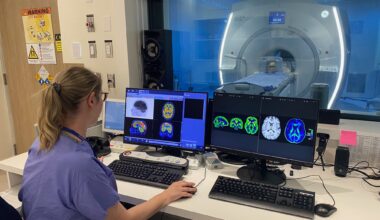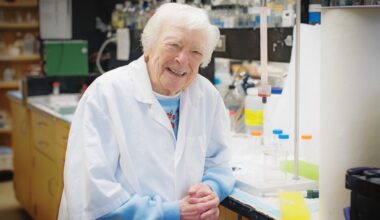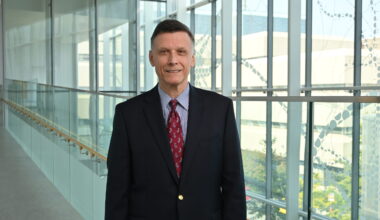This past year has been a year of incredible growth at the Djavad Mowafaghian Centre for Brain Health (“the Centre”), and over the next few months, we’ll be welcoming five new labs from the UBC Department of Psychology into Centre space. By bringing together experts from disciplines previously housed across the UBC campus and having them work in close proximity with one another within the Centre and in the Koerner labs, we look forward to seeing even more opportunities for knowledge exchange and collaboration.
We hope you’ll join us in welcoming:
- Dr. Catharine Winstanley
- Dr. Kiran Soma
- Dr. Liisa Galea
- Dr. Jason Snyder
- Dr. Stan Floresco
Dr. Catharine Winstanley
Dr. Winstanley and her team actually moved in last year, but our official welcome to her and her lab is overdue. Dr. Winstanley and her team conduct research on the fourth floor of the Centre (with additional space in the Centre for Disease Modelling in the Life Sciences Institute); her lab is interested in understanding vulnerability to addiction disorders, particularly drug addiction and gambling disorder, and hopes to contribute to the development of better therapeutics.
MOST RECENT PUBLICATION:
WORK SHE’S MOST PROUD OF:
- Dopamine D3 Receptors Modulate the Ability of Win-Paired Cues to Increase Risky Choice in a Rat Gambling Task.
- Long-term, calorie-restricted intake of a high-fat diet in rats reduces impulse control and ventral striatal D2 receptor signalling – two markers of addiction vulnerability.
OPPORTUNITIES FOR COLLABORATION:
“We are always really keen to collaborate with clinical groups, to see if our research findings will translate into effective interventions in patients,” says Dr. Winstanley. “That’s one of the main reasons that the Centre is such an exciting environment for me and my team, because that focus on translation was at the heart of the idea for the unit.”
Dr. Winstanley is particularly hopeful about a lead her team has on a compound that could effectively block some of the psychiatric side-effects of some Parkinson disease medications, making them much more tolerable to patients.
“We’re also part of an international collaboration researching a novel lithium-like drug that could offer all the benefits of lithium as a mood stabilizer without the toxicity and side-effect problems.”
ON A PERSONAL NOTE:
“With two preschool-aged children at home, life outside the lab is always full of unexpected delights and challenges! As with most people living in this amazing city, I love spending time outdoors. Snowboarding and hiking have had to take a bit of a backseat until the kids get a bit older, but I’m really enjoying being a member of our local gardening club – it’s a great connection to my local community, and an amazing repository of local knowledge as to how to get your garden growing. Plus, they make the best tea.”
CONNECT WITH DR. WINSTANLEY:
- Twitter:
- Website: Laboratory of Molecular and Behavioural Neuroscience
- DMCBH member profile
Dr. Kiran Soma
Dr. Kiran Soma is moving his lab into the Koerner Pavilion this fall. His research looks at how hormones affect the brain, behaviour, and immune system.
“In particular, I focus on steroid hormones, such as testosterone, estradiol and cortisol. These steroids are produced not only in classical endocrine glands, like the gonads and adrenals, but also in the brain and immune organs,” says Dr. Soma.
“This surprising realization has important implications for both basic researchers and clinicians.”
MOST RECENT PUBLICATION:
Lymphoid organs of neonatal and adult mice preferentially produce active glucocorticoids from metabolites, not precursors. (Read a UBC Psychology Q&A with Dr. Soma about this – his 100th – publication.)
WORK HE’S MOST PROUD OF:
“It’s hard to pick just one thing! But what I’m most proud of is my diverse group of past and present trainees, from undergraduates to postdoctoral fellows. They are already doing amazing things and making important contributions to Canada and the world. My past trainees are now in a wide range of professions, working in academia, hospital labs, medicine, law, business and pharma. I’m proud to have contributed to their scientific training and critical thinking and communication skills.”
OPPORTUNITIES FOR COLLABORATION:
Dr. Soma is always looking for great collaborators, and has ongoing collaborations with other neuroscientists, but also immunologists, microbiologists, cancer biologists, chemists, and physiologists. Using a CFI award, he recently purchased a state-of-the-art system for liquid chromatography-tandem mass spectrometry (LC-MS/MS) in order to conduct high-throughput steroid profiling.
“I welcome collaborations that take advantage of this exciting new infrastructure,” Dr. Soma says.
ON A PERSONAL NOTE:
“I’m a big advocate for real food, rather than ‘edible food-like substances,’” says Dr. Soma. “I think this is a critical way that we can profoundly improve our health, including our brain health, as individuals and as a society.”
“On a related note, my lab is currently examining the effects of dietary manipulations, such as a high-sucrose diet, on the brain, hormones, and behaviour. Stay tuned!”
CONNECT WITH DR. SOMA:
Dr. Liisa Galea
Dr. Galea moved into lab space on the fourth floor of the Centre this summer. Her research focus is understanding the way that sex hormones influence brain health and disease in women and men. The main goal of her research is to improve brain health for both sexes by examining the influence of sex and sex hormones on normal and diseased brain states such as depression and Alzheimer disease.
“Although sex differences exist in many brain diseases, research targeting sex as a factor in brain health has been scarce,” says Dr. Galea. “For example, both depression and Alzheimer’s disease are more prevalent in women, and furthermore men and women show different symptoms in many diseases (not just limited to brain diseases).”
Dr. Galea developed the first preclinical models of postpartum depression, and was among the first researchers worldwide to study hormonal control of adult neurogenesis and the impact of motherhood on the brain in later life.
MOST RECENT PUBLICATION:
Why estrogens matter for behavior and brain health.
WORK SHE’S MOST PROUD OF:
“Probably my favourite work right now is studying the maternal brain,” says Dr. Galea.
“Pregnancy and motherhood are major events in a women’s life, but what is less well known is that it can have permanent influences on the brain. Anxiety and depression are more likely during the postpartum period, but there are other effects that we see in middle age with motherhood which can have profound implications for disease risk. Some of our recent research has shown that the postpartum period alters the effectiveness of pharmacological treatment.”
OPPORTUNITIES FOR COLLABORATION:
The Galea lab is interested in examining whether some of their findings in the maternal brain are due to changes in neuroinflammation and gene expression in various regions of the brain. They are also in the early stages of collaborations to examine whether their preclinical findings may extend into the clinic.
ON A PERSONAL NOTE:
Dr. Galea is a staunch advocate for women in science and technology, and in leadership roles in academia; she also advocates for the elderly, and improving treatments and care for this vulnerable population.
“Our older generations deserve more attention from researchers and the medical community,” she says.
While Dr. Galea does harbour a secret ambition to one day make her name as a fantasy novelist – “Dave Duncan started his fantasy writing career at 55. I still have time!” – most of her side-projects are research related.
“Some side projects include studying effects of chemotherapy on depression, cognition and plasticity within the brain – particularly in female subjects – and sex differences in the efficacy of exercise to boost cognition. Both of these projects we are doing in collaboration with human health researchers at UBC.”
CONNECT WITH DR. GALEA:
- Twitter: @liisagalea
- Website: Laboratory of Behavioural Neuroendocrinology
- DMCBH member profile
Dr. Jason Snyder
Dr. Snyder will move his lab into Koerner this fall. The Snyder lab studies adult neurogenesis, the process by which new neurons grow inside the adult brain.
“We all know that you can heal a cut by growing new skin cells but traditionally it has been assumed that the brain is not capable of such repair, and that it cannot produce new neurons beyond early childhood,” says Dr. Snyder. “Amazingly, it turns out that the brains of animals and humans can produce new neurons in adulthood. Are they important for brain function and mental health? The short answer is we don’t know, but we think so!”
“One of our recent studies found that blocking neurogenesis affects memory, but only under stressful conditions. The surprising finding is that male and female rats were completely opposite: blocking neurogenesis caused male rats to learn better under low-stress conditions, but it caused female rats to learn better under high-stress conditions,” Dr. Snyder says.
“This is exciting because it may help explain why there are sex differences in susceptibility to stress-related disorders such as anxiety and depression. Now we are investigating how these new neurons form connections in the brain, and how their activity patterns relate to these stress-related learning functions.”
MOST RECENT PUBLICATION:
A transgenic rat for specifically inhibiting adult neurogenesis.
WORK HE’S MOST PROUD OF:
In 2009, Dr. Snyder found that new neurons are added in larger numbers in rats, they mature faster in rats, and they may play a greater role in behavior in rats.
“This was a fun paper because at the time there was conflict in the field regarding the function of neurogenesis,” he says. “I was switching from rat to mouse models and wondered if these discrepancies might be explained by rat-mouse differences and, to my surprise, pretty much every aspect of my hypothesis turned out to be correct, which is rare!”
“It was a basic study but I like it because it reconciled much of the literature and is hopefully helpful for others who are weighing the advantages of using mice versus rats for their future experiments.”
OPPORTUNITIES FOR COLLABORATION:
The Snyder lab is eager to collaborate: “You can’t do everything yourself!”
“Currently, within the lab we have behaviorists, molecular biologists and neuroanatomists working together. To make sense of the complex behaviors and rich biological datasets, we will need to work with computational experts. We are looking to work with physiologists to identify mechanisms by which new cells participate in memory formation. And we are increasingly interested in working with others to extend our rodent findings to higher mammals, including humans.”
ON A PERSONAL NOTE:
Dr. Snyder is an avid photographer who keeps a camera nearby at all times. “I’m always on the lookout for beauty, absurdity, oddity or anything else that ends with ‘ty’,” he says.
“My photographs and related projects are on my personal website, www.jasonsynder.com.”
He is also enthusiastic about home coffee roasting, which could be the impetus for getting together with researchers on site and generating opportunities to bring new research collaborations to life.
CONNECT WITH DR. SNYDER:
- Twitter: @jsnsndr
- Website: The Snyder Lab
- DMCBH member profile
Dr. Stan Floresco
Dr. Floresco’s work focuses on understanding how different brain regions that are interconnected with the dopamine system and frontal lobes interact to facilitate complex forms of cognition, and how dysfunctions in these systems may relate to psychiatric illness including schizophrenia, depression, and addiction.
“The idea is by understanding how the normal brain solves certain types of problems, we can gain insight into brain dysfunction that underlies impaired cognition associated with these diseases,” says Dr. Floresco.
MOST RECENT PUBLICATION:
WORK HE’S MOST PROUD OF:
“I feel that our work on how dopamine works in different nodes of brain circuitry to modify and refine risk/reward decision making has really made an impact on our understanding of the dynamic interactions between different brain systems that guide how we choose between different options, and also provided more basic insight into how dopamine regulates complex forms of behavior.”
OPPORTUNITIES FOR COLLABORATION:
“I’d be very interested in collaborations that would enable us to explore the patterns of neural activity that are associated with the different types of cognition we study,” says Dr. Floresco.
“We are also enthusiastic about working with other groups that are modeling certain psychiatric disorders that are interested in translational research exploring how their models may alter cognition.”
ON A PERSONAL NOTE:
Dr. Floresco is committed to learning more about risk/reward decision-making, and as such tries to make it down to Las Vegas at least twice per year.
CONNECT WITH DR. FLORESCO:
- Twitter: @dr_stan
- DMCBH member profile


